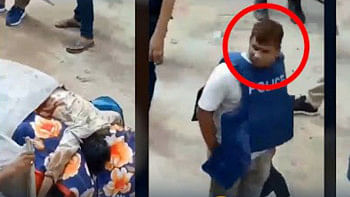Peace recipe
Political analysts yesterday suggested constitutional amendments, including changes to the electoral systems, balancing power between the president and prime minister, to strengthen democracy and end the recurrent violence around election time.
They also recommended introducing bicameral legislature -- where there are two assemblies -- for better check and balance, referendum on important national issues, and strengthening the constitutional institutions.
Stating that political parties were becoming weak, which was a matter of concern for democracy, the experts said periodic violence around elections, including the present hartal and blockade, were ruining the country's potentials.
The observations came at a discussion titled “Rethinking Democratisation: Consensus Building for Results” organised by the Policy Research Institute and International Political Science Association at the PRI conference hall in the city.
“Now, absolute power remains in the centre … political parties have been de-democratised for the power of money,” said eminent economist Prof Rehman Sobhan while addressing as chief guest in the discussion.
Money was the prime factor in nominating election candidates, even at local government levels, he said. The members of parliament have a direct control over the locally elected peoples' representatives, something that made the democratic system truly weak, he said.
Terming the over two-month-long hartals and blockade a mere “low-grade” violence, Prof Sobhan, first member of Bangladesh's planning commission, said the parties calling for hartals were failing to mobilise people.
“The support for hartal is actually zero. This hartal is totally immoral and counter productive,” said Sobhan, adding that it meant the political parties were getting weak.
Its consequences were very dangerous as in the past the political parties fell into non-democratic process, he warned. In his keynote paper, Prof Emeritus Zillur Rahman Khan of the University of Wisconsin, USA, proposed proportional representation in parliament where allocation of parliamentary seats would reflect the percentage of votes earned by contesting political parties in the general election.
He suggested that the parliament have two houses, with one checking any excesses of the other. Considering the size of Bangladesh's population, he suggested increasing the parliamentary seats to 500 in the lower house and 100 in his proposed upper house.
Zillur Rahman, also chairman, RC 37, International Political Science Association, floated the idea of holding the next general elections under an elected interim government composed of elected leaders from two largest parties with their top leaders serving as co-chairs.
Akbar Ali Khan, former adviser to a caretaker government, said elections under the present arrangements were unlikely to be fair, with election officials getting involved in corruption.
He supported Prof Zillur's idea of proportional representation in parliament and a bicameral legislature.
“The political parties are very divisive and exchange rebukes. If the parliament is representational, there will be exchanges between them,” Akbar Ali Khan said.
He also suggested enhancing the power of the president, and referendum on nationally important issues.
“President's power in our country is less than that of a section officer. A section officer can write a note against a government policy and his or her higher officials can correct it. But, there is no provision in the constitution for the president to have a different opinion,” he said.
Former chief election commissioner ATM Shamsul Huda said under the present system, a political party might have brute majority in parliament by having marginally higher votes, which was quite unacceptable.
Such anomalies could be avoided by proportional representation system, Huda said, stressing on reforms to the Election Commission, Public Service Commission, Anti-Corruption Commission, the judiciary, police and bureaucracy to institutionalise democratic values.
BNP Chairperson's Adviser Enam Ahmed Chowdhury said a dialogue between the government and the opposition political parties was a necessity to find solutions to the present political problem.
“Repression on the opposition cannot bring any solution,” he said.
Economist M Syeduzzaman suggested stronger local government system and establishing Ombudsman to hold accountable the bureaucracy and the police.
Bangladesh Bank's former governor Farashuddin observed that the reforms could not be made overnight and that fixing the existing system first would be wise. Gradual and needful reforms could be made, he said.
Political scientist Prof Rounaq Jahan said there were many good laws in Bangladesh but those were not being implemented.
She said before considering the issues of referendum and sharing of power between the president and the prime minister, it was important to investigate the factors behind the culture of impunity.
She also said she was worried over the political future of Bangladesh, especially since the present generation thinks this situation to be normal.
Political science professor Ataur Rahman of Dhaka University noted that Bangladesh would become a conflicted society if the major political parties kept on locking horns the way they were doing.
PRI Executive Director Ahsan H Mansur, Shujan Secretary Badiul Alam Majumder, former commerce secretary Sohel Chowdhury, daily Ittefaq acting editor Tasmima Hossain also spoke at the discussion moderated by Brac University Pro Emeritus Manzoor Ahmed.
A Bangla book titled The Third World Charismat: Shiekh Mujib and Struggle for Freedom written by Prof Zillur was also unveiled after the programme.

 For all latest news, follow The Daily Star's Google News channel.
For all latest news, follow The Daily Star's Google News channel. 




Comments